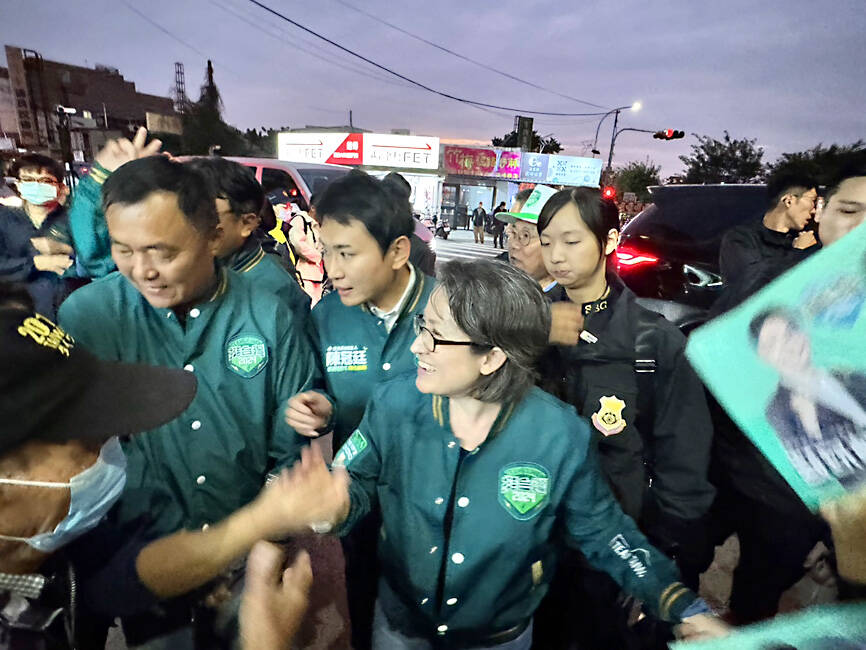Democratic Progressive Party (DPP) vice presidential candidate Hsiao Bi-khim (蕭美琴) on Tuesday questioned the relevance of the so-called “1992 consensus,” a key element of the Chinese Nationalist Party’s (KMT) China policy, which she called outdated.
“The KMT insists on adhering to the ‘1992 consensus,’ a stance they have maintained for more than 30 years. However, our society is focused on moving forward, isn’t it?” Hsiao told a rally in Yunlin County.
The “1992 consensus,” a term former Mainland Affairs Council chairman Su Chi (蘇起) in 2006 admitted making up in 2000, refers to a tacit understanding between the KMT and the Chinese Communist Party that both sides of the Taiwan Strait acknowledge that there is “one China,” with each side having its own interpretation of what “China” means.

Photo: Tsai Tsung-Hsun, Taipei Times
The DPP has never acknowledged the “1992 consensus,” saying that Beijing does not recognize the Republic of China and acceptance of the understanding would imply agreement with China’s claim over Taiwan.
China considers recognition of the “1992 consensus” a prerequisite for dialogue between the two sides and has cut off all communications with Taipei since the DPP came to power in 2016.
“How can we rely on proposals from three decades ago to navigate the modern world?” Hsiao, the former representative to the US, said in Hoklo (commonly known as Taiwanese).
In 1992, China was just beginning its journey toward reform and opening up, when then-Chinese leader Deng Xiaoping (鄧小平) advocated for a low-key approach and emphasized economic development, she said.
That prompted numerous Taiwanese businesses to invest and do business in China, she said.
“However, the China we see today is different from that of 1992. China has been suppressing human rights, affecting many Taiwanese businesses there,” she said.
During the presidency of former president Ma Ying-jeou (馬英九), many Taiwanese businesses invested heavily in China after the signing of the Economic Cooperation Framework Agreement with Beijing in 2010, Hsiao said.
“Now we are in a situation where we’ve placed numerous eggs in one basket, and unfortunately, that basket has encountered some issues,” the former diplomat said.
For example, the unemployment rate among young Chinese has passed 20 percent, with some academics suggesting it might even reach as high as 40 percent, she said.
To mitigate the risks of overreliance on China, Taiwan has affirmed its commitment to “connect with the world,” becoming the first country with which US President Joe Biden signed a trade agreement after assuming office in 2021, she said, referring to the US-Taiwan Initiative on 21st-Century Trade.
The first agreement under the initiative, launched in June last year, was signed by both sides in June.
The current trade volume between Taiwan and the US is more than double what it was when President Tsai Ing-wen (蔡英文) was elected in 2016.
Hsiao, 52, last month resigned as representative to the US, where she had served for more than three years, to join the presidential ticket of Vice President William Lai (賴清德).

Taiwan is stepping up plans to create self-sufficient supply chains for combat drones and increase foreign orders from the US to counter China’s numerical superiority, a defense official said on Saturday. Commenting on condition of anonymity, the official said the nation’s armed forces are in agreement with US Admiral Samuel Paparo’s assessment that Taiwan’s military must be prepared to turn the nation’s waters into a “hellscape” for the Chinese People’s Liberation Army (PLA). Paparo, the commander of the US Indo-Pacific Command, reiterated the concept during a Congressional hearing in Washington on Wednesday. He first coined the term in a security conference last

Prosecutors today declined to say who was questioned regarding alleged forgery on petitions to recall Democratic Progressive Party (DPP) legislators, after Chinese-language media earlier reported that members of the Chinese Nationalist Party (KMT) Youth League were brought in for questioning. The Ministry of Justice Investigation Bureau confirmed that two people had been questioned, but did not disclose any further information about the ongoing investigation. KMT Youth League members Lee Hsiao-liang (李孝亮) and Liu Szu-yin (劉思吟) — who are leading the effort to recall DPP caucus chief executive Rosalia Wu (吳思瑤) and Legislator Wu Pei-yi (吳沛憶) — both posted on Facebook saying: “I

The Ministry of Economic Affairs has fined Taobao NT$1.2 million (US$36,912) for advertisements that exceed its approved business scope, requiring the Chinese e-commerce platform to make corrections in the first half of this year or its license may be revoked. Lawmakers have called for stricter enforcement of Chinese e-commerce platforms and measures to prevent China from laundering its goods through Taiwan in response to US President Donald Trump’s heavy tariffs on China. The Legislative Yuan’s Finance Committee met today to discuss policies to prevent China from dumping goods in Taiwan, inviting government agencies to report. Democratic Progressive Party Legislator Kuo Kuo-wen (郭國文) said

Sung Chien-liang (宋建樑), who led efforts to recall Democratic Progressive Party (DPP) Legislator Lee Kun-cheng (李坤城), was released on bail of NT$80,000 today amid outcry over his decision to wear a Nazi armband to questioning the night before. Sung arrived at the New Taipei District Prosecutors’ Office for questioning in a recall petition forgery case last night wearing a red armband bearing a swastika, carrying a copy of Adolf Hitler’s Mein Kampf and giving a Nazi salute. Sung left the building at 1:15am without the armband and covering the book with his coat. Lee said today that this is a serious